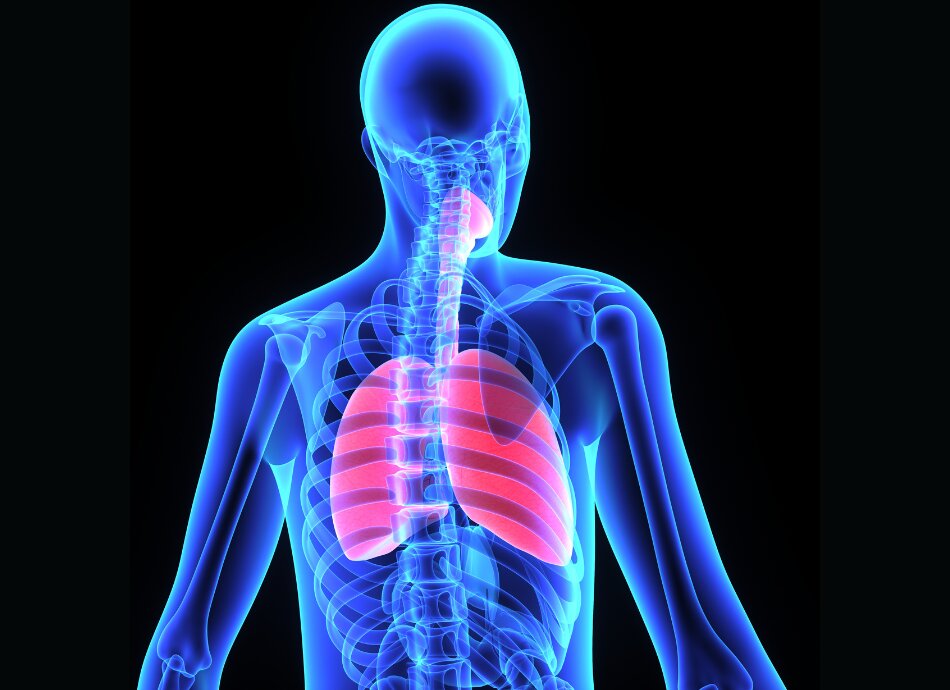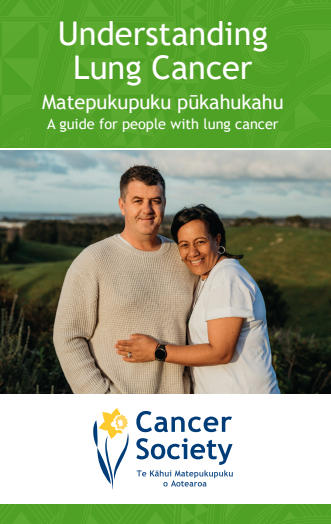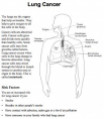Your lungs are in your chest and are protected by your rib cage. They supply oxygen to your body.
Low or no data? Visit zero.govt.nz, scroll down the page then click on our logo to return to our site and browse for free.
Lung cancer | Mate pukupuku
Key points about lung cancer
- Lung cancer (mate pukupuku) is a type of cancer that begins in your lungs. If left untreated, it can spread beyond your lungs into nearby tissue or other parts of your body.
- Smoking is the main cause of lung cancer, but 1 in 5 people diagnosed with lung cancer have never smoked.
- Signs and symptoms of lung cancer include a cough that doesn't go away and gets worse over time, constant chest or shoulder pain, shortness of breath, wheezing, coughing up blood or constant tiredness.
- Lung cancer is difficult to find early so if you notice any of these symptoms, talk to your healthcare provider.
- Treatment depends on the type and stage (how far it has spread), its location and your general health and wishes.

Lung cancer begins when abnormal cells grow in an uncontrolled way in one or both lungs.
Types of lung cancer:
- small-cell lung cancer
- non-small cell lung cancer
- other rare types.
People who smoke tobacco or smoked in the past are at the highest risk for lung cancer. But anyone can get lung cancer – 1 in 5 people diagnosed with lung cancer have never smoked. The chance of developing lung cancer increases with age.
Anything that can increase your risk is called a risk factor. Having one or more of these risk factors does not mean that you will develop lung cancer.
The risk factors for lung cancer are:
- smoking, especially if you began smoking when young, smoked for a long period of time and smoked often
- exposure to second-hand smoke
- family history of lung cancer
- a history of lung disease, eg, chronic obstructive pulmonary disease
- a history of cancer
- exposure to cancer-causing agents such as asbestos, radon, diesel exhaust and air pollution.
There may be no warning signs that you have lung cancer.
Some signs and symptoms may include:
- a cough that doesn't go away and gets worse over time
- constant chest pain or shoulder pain
- shortness of breath or wheezing or hoarse voice
- lots of lung infections such as bronchitis or pneumonia
- coughing up blood
- a chest infection that will not go away
- weight loss
- constant tiredness.
If you are experiencing any of these signs or symptoms, please contact your doctor immediately. Many other conditions can cause these symptoms, but it's best to get them checked out.
Lung cancer is a difficult cancer to find early. It is important to talk about any of your symptoms with your doctor as soon as you can. Your doctor can arrange the tests to assess your symptoms.
Doctors will listen to your chest for anything unusual. They may arrange further such as:
- sputum test (coughing up mucus or phlegm into a little container)
- a chest x-ray
- CT scan or PET-CT scan.
The doctor may also refer you to a specialist to do further tests, such as a bronchoscopy. This is when a small tube that has a camera attached is inserted through your nose to look inside your airways that lead to your lungs. You may be referred for a lung biopsy.
The treatment for lung cancer depends on the type and stage (how far it has spread), the location of the tumour and your general health and wishes.
Treatment options may include surgery, radiation, chemotherapy, radiofrequency ablation, targeted therapy, and immunotherapy. Other treatment options may also be offered.
There is no certain way to prevent cancer, but there are some things you can do that may reduce your chances of getting it.
These include:
- not smoking, and if you do smoke, quit as soon as possible
- avoiding second-hand smoking – smoke from other people's cigarettes, cigars or pipes
- avoiding asbestos
- avoiding exposure to cancer-causing agents.
The following links provide further information about lung cancer. Be aware that websites from other countries may have information that differs from New Zealand recommendations.
Lung Foundation NZ(external link)
Quitline NZ(external link)
Resources
Lung cancer(external link) Asthma Respiratory Foundation NZ, 2010
Understanding lung cancer(external link) Cancer Society, NZ, 2022
Living well with cancer – eating well [PDF, 5.5 MB] Cancer Society, NZ, 2020 English/te reo Māori [PDF, 5.5 MB]
Supporting someone with cancer [PDF, 3 MB] Cancer Society, NZ, 2015
Coping with cancer(external link) Cancer Society NZ, 2013
The following information on early detection of lung cancer in primary care(external link) is taken from BPAC, NZ, 2021:
|
Immediate referral to the emergency department is indicated for people with: |
|
|
When to refer patients with suspected lung cancer |
|
Urgent referral for assessment by a respiratory physician is indicated for:
|
Clinical guidelines and resources
Early detection of lung cancer in primary care(external link) BPAC, NZ, 2021
Lung cancer follow-up and surveillance – the role of primary care(external link) PBAC, NZ, 2021
Lung cancer in NZ – overcoming barriers(external link) BPAC, NZ, 2012
General practitioners and cancer control(external link) The Medical Journal of Australia, 2007
Investigating symptoms of lung cancer – GP guide(external link) Australia Lung Foundation, 2012
Clinical decision support(external link) British Medical Journal, UK
Te ha ora – the breath of life – national respiratory strategy(external link) Asthma & Respiratory Foundation, NZ, 2015
Serious illness conversation guide Aotearoa(external link) Health Quality & Safety Commission, NZ, 2019
Prioritising primary care patients with unexpected weight loss for cancer investigation: diagnostic accuracy study(external link) The BMJ, UK, 2020
Brochures

Cancer Society, NZ, 2022

Asthma Respiratory Foundation NZ, 2010
Lung cancer factsheet
Health Information Translations, US, 2016
English, Arabic, Bosnian, Chinese (simplified), Chinese (traditional), French, Hindi, Japanese, Korean, Portuguese, Russian, Somali, Spanish, Tagalog, Vietnamese
Note: This resource is from overseas so some details may be different in NZ, eg, phone 111 for emergencies or, if it’s not an emergency, freephone Healthline 0800 611 116.
Credits: Used with permission and adapted from content from Te Aho o Te Kahu | The Cancer Control Agency
Reviewed by: Healthify editorial team. Healthify is brought to you by Health Navigator Charitable Trust.
Last reviewed:
Page last updated:






